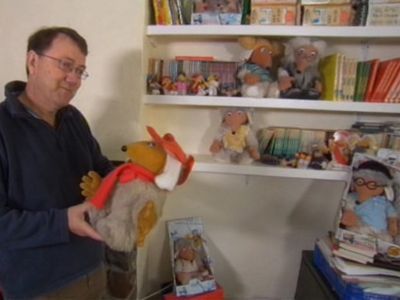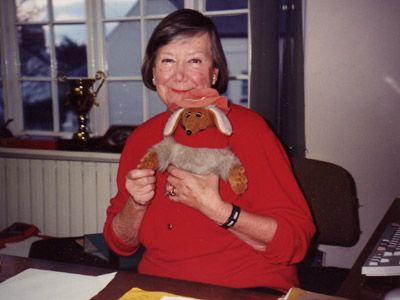Elisabeth Beresford’s son ‘fights for the soul of the Wombles’
Marcus Robertson has criticised the new owners of the Wombles in an interview with the Mail on Sunday newspaper, in an effort to protect his mother’s legacy.
The author’s son is unhappy with the direction taken by the new animators, feeling that Elisabeth Beresford’s wishes have been ignored, in favour of what the Mail describes as ‘the modern world of identity politics’.
“It’s a fight for the soul of the Wombles,” says Marcus.
The computer-generated characters (not to be confused with those that Mike Batt’s Dramatico Animation company was previously developing) now have assorted fur colours and textures, visible mouths with teeth, and updated outfits.
But Marcus argues: “Wombles have grey fur and orangey-brown faces. They’re not white. They’re not black. Wombles are Wombles. As far as the family is concerned, it should be a very simple story for children to enjoy, with no hidden messages other than the one that has always been there - about looking after their surroundings. Wombles are not humans. Sometimes I think that’s not understood.”
When Elisabeth Beresford created Stepney for the late 1990s ITV series, made by Canadian company Cinar, Marcus says, “the idea was that Stepney would represent people from more diverse parts of London and that he’d have dreadlocks. But the company blacked him up, against Mum’s wishes. As she feared, it got absolutely panned by the critics. It was dismissed as patronising.”
The Wombles have always been quite multicultural - particularly when they visited far-flung burrows in the 1976 book The Wombles Go Round The World - and of course they’re all named after places on the map.

Yet in recent conversations with the rightsholders about the future of the Wombles, Marcus says it was implied that his mother’s views had been racist. “Mum would be so hurt by that,” he says. “It’s so insulting to her memory.”
A ‘source close to the new project’ told the Mail on Sunday: “The original Wombles came from a different era and some of the things they say could come across as sexist or not politically correct for today’s audience.”
Until 2013, the rights to the Wombles were shared equally between Elisabeth Beresford’s children (after her death in 2010) and Mike Batt. Mike’s company Dramatico then took a controlling stake, after years of gathering all the rights together, with big plans for a new TV series and more. Mike pledged to “protect and look after the quality and integrity of the characters as we always have done”.
However, after Mike had to abandon the project and filed for personal bankruptcy in 2017, British businessman Craig Treharne bought his stake and began a makeover for a new generation.
Marcus says: “We’d had an agreement with Mike that we would get the opportunity to buy the rights back if anything went wrong. But before we knew it, Craig had bailed him out.”
Now Marcus feels that the family’s knowledge of the Wombles’ values isn’t being taken into account. “They asked for our opinion but after that we were cut out. We own 15 per cent of the business so we’d still make money from it, but that’s not the point. We want it to be done properly and for the people who are driving it forward to be sympathetic to the creative history. I don’t have a problem with them being successful if they were straight and consulted us.”
Marcus and his family are aiming to put any profits they receive into a Womble Foundation for children’s and environmental charities, in keeping with the spirit of the Wombles.

The Wombles were based on members of Elisabeth Beresford’s family, so naturally Marcus feels an affinity with them - and lazy Orinoco, who became one of the most loved characters, was inspired by young Marcus himself.
He says: "Children just want something that captures their imagination. I’m not a creative writer but I still know how to think like a Womble.
"I’ve lived with them since I was ten. I never felt like the real Christopher Robin, who hated his father’s Winnie-the-Pooh books. What an honour to be a Womble! I’ve never once wished this hadn’t happened - until now, sadly. I’m hating this now.
“The Wombles are based on honesty, transparency and good human values. That’s the way they got on. They had foibles, as we all do, but the idea of it becoming a money-machine for people who don’t understand the values of the Wombles is terrible. I want someone who just gets it.”
- The Mail on Sunday: Accusing the Wombles of being racist is an insult to my mum’s memory
- The Telegraph (£): ‘Woke Wombles’ remake is an insult to my mother’s memory, says son of creator
- Daily Mail Online: Piers Morgan blasts ‘completely and utterly insane’ remake of beloved children’s show featuring new-look PC characters
- Metro: Should the Wombles be diverse? Piers Morgan kicks off over ‘Woke Wombles’ reboot
- The Telegraph (£): The biggest problem with the Wombles’ ‘woke’ makeover – kids will hate it
- Daily Mail Online: GMB debates whether The Wombles’ skin colour should be changed to make them ‘relevant’
- The Mail on Sunday: The Anguish of Mr Womble as he is shut out of ‘woke’ remake

